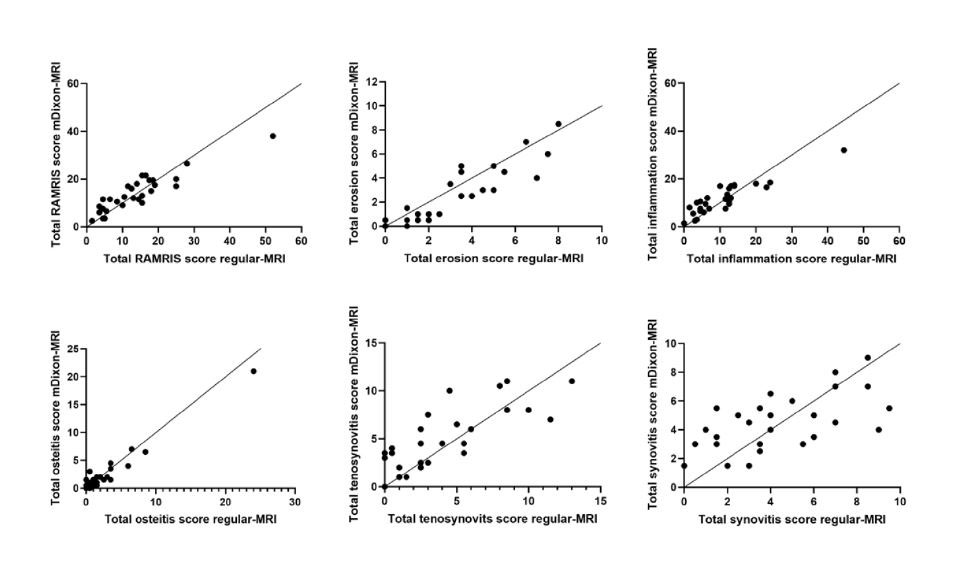Session Information
Session Type: Poster Session C
Session Time: 1:00PM-3:00PM
Background/Purpose: MRI of small joints is, despite its sensitivity in demonstrating inflammation, hardly used in rheumatologic clinical practice. Widespread use is hampered by invasiveness, long scan-time, and consequent high costs, associated with the recommended scan protocol, including contrast-agent enhanced and fluid sensitive-sequences. To improve the feasibility of MRI implementation in clinical practice, we introduce a modified Dixon-(mDixon)-sequence, which does not require contrast-agents and reduces total acquisition-time to 6-minutes. Because the reliability in relation to conventional MRI-sequences is unknown, we determined this.
Methods: Prior to our conventional MRI protocol, including Gd-chelate enhanced T1 sequences, a coronal and axial T2 weighted mDixon acquisition, of metacarpophalangeal-2-5 and wrist-joints were made of 29 early arthritis patients. Two readers scored osteitis, synovitis and tenosynovitis (summed as total MRI-inflammation), and erosions (all summed as total RAMRIS). Intraclass correlation coefficients (ICCs) between readers, and comparing the two sequences, were studied. Spearman correlations were determined.
Results: Performance between readers was good/excellent. Comparing mDixon- and conventional sequences revealed good/excellent reliability: ICC for total MRI-inflammation score was 0.84 (95%CI:0.69-0.82), for erosions 0.88 (95%CI:0.69-0.95), and for the total RAMRIS score 0.87 (95%CI:0.74-0.94). The scores of total MRI-inflammation, erosions and total RAMRIS were highly correlated (ρ=0.80, ρ=0.81, ρ=0.82, respectively).
Conclusion: mDixon-MRI providing fluid sensitive and in-phase images in two planes is reliable compared to the conventional extensive MRI protocol, suggesting it is accurate to detect joint-inflammation. The good correlation suggests this can be the first step towards a patient-friendly, short and affordable MRI-protocol, which can facilitate implementation of MRI for early detection of joint inflammation in rheumatology practice.
Legend: Spearman correlation coefficients for total RAMRIS (ρ=0.82), erosions (ρ=0.81), total inflammation score (ρ=0.80), osteitis (ρ=0.95), tenosynovitis ρ=0.64), and synovitis (ρ=0.36).
To cite this abstract in AMA style:
Boeren A, Niemantsverdriet E, Verstappen M, Wouters F, Reijnierse M, Bloem J, van der Helm-van Mil A. Towards a Simplified Fluid-sensitive MRI Protocol in Small Joints of the Hand in Early Arthritis Patients: Reliability Between mDixon and Regular FSE Fat Saturation MRI-sequences [abstract]. Arthritis Rheumatol. 2022; 74 (suppl 9). https://acrabstracts.org/abstract/towards-a-simplified-fluid-sensitive-mri-protocol-in-small-joints-of-the-hand-in-early-arthritis-patients-reliability-between-mdixon-and-regular-fse-fat-saturation-mri-sequences/. Accessed .« Back to ACR Convergence 2022
ACR Meeting Abstracts - https://acrabstracts.org/abstract/towards-a-simplified-fluid-sensitive-mri-protocol-in-small-joints-of-the-hand-in-early-arthritis-patients-reliability-between-mdixon-and-regular-fse-fat-saturation-mri-sequences/

